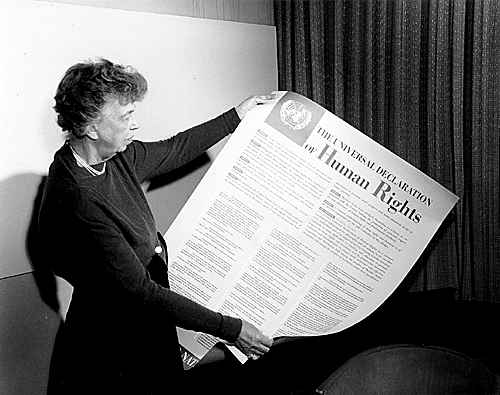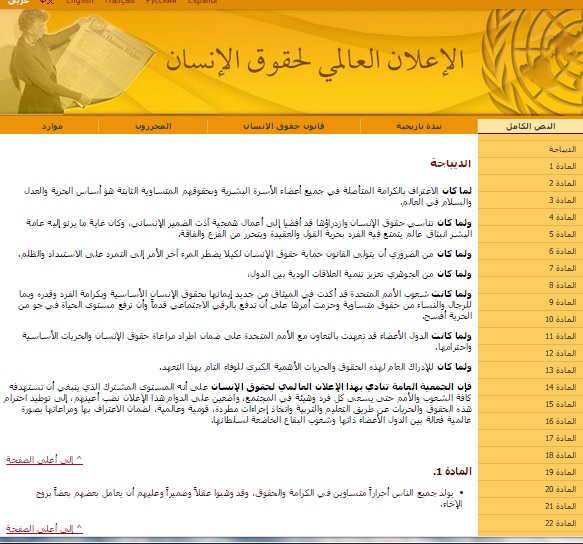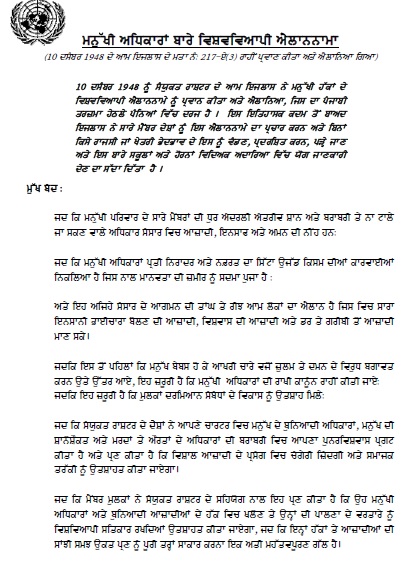It must not be too controversial for dialogue on extremism to take a consistent stand and commitment on our shared universal human rights, or then we have missed the primary challenge. We will not defeat extremism with political compromise, but by unyielding commitment to our shared universal human rights – for everyone, for every religion, for every identity group.
Extremist violence begins with denying the human rights, dignity, and security of others. Weakness in ignoring this reality only gives strength to those who seek power through violence, rejecting those human rights which they believe have no defenders.
When we offer a “counter extremist narrative,” we must ask, and what is that narrative based on – if not our universal human rights? What would appeal to diverse extremists of different ideologies that would be effective, if it is not grounded in our shared universal human rights? The ideas of building awareness and seeking intervention of the problem of such violence makes sense, but if such intervention is not based on our shared human right rights, we must ask “based on what?”
The economic aspect of the countering violent extremism (CVE) summit is worthy of consideration for some, but it is not going to be the answer to many, and we must keep human rights as our top priority. The fact is that people who have “something to lose” are (in general) less attracted to extremist violence. People may have extremist views in private, but when they have a family to support, a job to keep, and community responsibilities, the appeal of extremist violence is countered by the practical realities of other responsibilities in their lives. It is true that jobs and economic opportunity won’t stop people from pursuing a path to terrorism domestically or globally, but such other responsibilities will provide a distraction for some.
However, we will not convince many extremists that on solution focused on “prosperity,” “progress,” and other general terms are going to cause them to stop pursuing extremist goals and activities. We must recognize that for those with a different view on human rights, our chief objective must be a counter argument that all of our shared human rights will suffer, if we are not consistent on human rights for everyone.
When we lead with a commitment to our shared universal human rights, we don’t need explanations of “nuances” in policies to challenge violent extremist activity. There is no nuance in the call for our shared universal human rights to challenge violent extremist behavior.
The United Nations’ Universal Declaration of Human Rights (UDHR), ratified in 1958, creates a written standards of human rights for the people of the world. The UDHR was followed by an international treaty, the International Covenant on Civil and Political Rights. These standards of human rights provide the international agreements to counter violent extremist behavior from any ideology and any part of the world. Our leaders need to be governing based on these standards, which they are consciously ignoring. Those nations which have not ratified such human rights standards need to be challenged as to why they will not accept such fundamental human rights for all people.

The Hope for Our Children Around the World - A Commitment to Our Shared Universal Human Rights (Source: United Nations)
The UDHR is published in English, Arabic, Punjab, Cyrillic, Chinese, French, Spanish, and other languages. It must be a founding basis for discussions around the world on challenging violent extremist behavior.
While politicians typically focus on compromise, effective support of human rights requires consistency and sacrifice. Human rights campaigns are not a popularity contest, which appeals to politicians.
When we take a consistent stand on our shared universal human rights, the situation changes. We can challenge violent extremist activity by any ideology, because the activity is against our shared universal human rights. For example, from a human rights perspective, we must challenge both the terrorist activity by ISIS as well as the human rights abuses by Bashar al-Assad. Wrong is wrong, and our human rights matter in every instance.
A consistent stand is not the political one of making the “least bad choice,” but seeking support for shared human rights by all. If we really want to make change, if we really want to hear “grievances,” then this is where we start – consistency on our shared universal human rights.
It does not make sense for politicians and government leaders to extend an outstretched hand to groups known for extremist views, without urging them to support our shared universal human rights.
R.E.A.L. calls for a new summit, not of politicians, not of government leaders, but of individual leaders and identity group organizations to challenge violent extremist activity, who are willing to begin this discussion based on our shared universal human rights. R.E.A.L. calls for a summit based on support for our shared universal human rights, shared human dignity, and shared security.
We call for individuals and leaders to demand that our national leaders, our political leaders, and our representatives take a new view on challenging extremist activity, one where our share human rights is the focal point and the cornerstone, not swept aside as something we won’t talk about.
We call for national and global leaders to adopt and support the United Nations’ 1958 Universal Declaration of Human Rights (UDHR), and we call for leaders to use this as the basis to challenge and defy the ideologies of violent extremism in the United States of America and around the world.
The Universal Declaration of Human Rights is as relevant today as it was in the shadow of the atrocities by Nazi Germany, as described in its Preamble:
“Whereas recognition of the inherent dignity and of the equal and inalienable rights of all members of the human family is the foundation of freedom, justice and peace in the world,”
“Whereas disregard and contempt for human rights have resulted in barbarous acts which have outraged the conscience of mankind, and the advent of a world in which human beings shall enjoy freedom of speech and belief and freedom from fear and want has been proclaimed as the highest aspiration of the common people,”
“Whereas it is essential, if man is not to be compelled to have recourse, as a last resort, to rebellion against tyranny and oppression, that human rights should be protected by the rule of law,”
“Whereas it is essential to promote the development of friendly relations between nations,”
“Whereas the peoples of the United Nations have in the Charter reaffirmed their faith in fundamental human rights, in the dignity and worth of the human person and in the equal rights of men and women and have determined to promote social progress and better standards of life in larger freedom,”
“Whereas Member States have pledged themselves to achieve, in co-operation with the United Nations, the promotion of universal respect for and observance of human rights and fundamental freedoms,”
“Whereas a common understanding of these rights and freedoms is of the greatest importance for the full realization of this pledge,”
“Now, Therefore THE GENERAL ASSEMBLY proclaims THIS UNIVERSAL DECLARATION OF HUMAN RIGHTS as a common standard of achievement for all peoples and all nations, to the end that every individual and every organ of society, keeping this Declaration constantly in mind, shall strive by teaching and education to promote respect for these rights and freedoms and by progressive measures, national and international, to secure their universal and effective recognition and observance, both among the peoples of Member States themselves and among the peoples of territories under their jurisdiction.”
Article One of the UDHR provides the basis for challenging all violent extremist activity: “All human beings are born free and equal in dignity and rights. They are endowed with reason and conscience and should act towards one another in a spirit of brotherhood.”
We must have a summit of our fellow human beings, not based on political positioning, but based on our support of these shared universal human rights.
We urge all of our brothers and sisters in humanity to be Responsible for Equality And Liberty for all.



